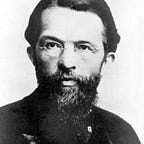A critique of Murray Rothbard’s “Why Be Libertarian”
Murray Rothbard in ‘Why Be Libertarian?’, a chapter from ‘Egalitarianism As a Revolt Against Nature’:
“Why be libertarian, anyway? By this we mean, what’s the point of the whole thing? Why engage in a deep and lifelong commitment to the principle and the goal of individual liberty? …
Ideas, and especially radical ideas, do not advance in the world in and by themselves, as it were in a vacuum; they can only be advanced by people and, therefore, the development and advancement of such people — and therefore of a ‘movement’ — becomes a prime task for the libertarian who is really serious about advancing his goals. …
..we must also see that utilitarianism — the common ground of free-market economists — is unsatisfactory for developing a flourishing libertarian movement. While it is true and valuable to know that a free market would bring far greater abundance and a healthier economy to everyone, rich and poor alike, a critical problem is whether this knowledge is enough to bring many people to a lifelong dedication to liberty.
In short, how many people will man the barricades and endure the many sacrifices that a consistent devotion to liberty entails, merely so that umpteen percent more people will have better bathtubs? Will they not rather set up for an easy life and forget the umpteen percent bathtubs? Ultimately, then, utilitarian economics, while indispensable in the developed structure of libertarian thought and action, is almost as unsatisfactory a basic ground work for the movement as those opportunists who simply seek a short-range profit.
It is our view that a flourishing libertarian movement, a lifelong dedication to liberty can only be grounded on a passion for justice. Here must be the mainspring of our drive, the armor that will sustain us in all the storms ahead, not the search for a quick buck, the playing of intellectual games or the cool calculation of general economic gains. And, to have a passion for justice, one must have a theory of what justice and injustice are — in short, a set of ethical principles of justice and injustice, which cannot be provided by utilitarian economics.
It is because we see the world reeking with injustices piled one on another to the very heavens that we are impelled to do all that we can to seek a world in which these and other injustices will be eradicated.”
The market of economic cooperation is a means to human ends. Why do I support ownership of the farm by the farmer? Because I believe it is in my own interest (more explanation here, here and here). Rothbard here creates a bad interpretation of Misesian utilitarianism. It is not the attainment of a single good by other people that is concerned; it is the attainment (psychic profit) of one’s own value scale that is concerned. That value scale can be concerned with everything under the sun, including friendship, peace, beauty, joy, spirituality, computer games, and yes, a clean bath.
The difference between economic cooperation and fighting is not more or less bathtubs; it is between bathtubs and death. The difference between a Western-style government and a free market is not a few more bathtubs; it is so life changing it can hardly be described. I could perhaps say “a hundred Hong Kongs”. And for people not in a first world country, the change in life opportunities would be even larger.
If the consequences of economic cooperation are properly understood, then each individual can make his own estimation of what is and is not considered a sacrifice for him. If something is considered an overall sacrifice, why should he make it? If individuals are no longer willing to sacrifice themselves for something they do not expect to benefit from, how is that a bad thing? A notion of ‘justice’ that is not derived from personal human ends is one of the big problems in the world today.
